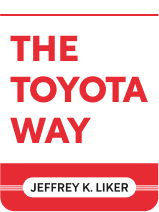

This article is an excerpt from the Shortform book guide to "The Toyota Way" by Jeffrey K. Liker. Shortform has the world's best summaries and analyses of books you should be reading.
Like this article? Sign up for a free trial here .
What is Toyota’s company history? How did lean manufacturing become popular?
In The Toyota Way, Jeffrey Liker recounts Toyota’s history as a car manufacturing company. He explains the beginning of the Toyota Production System, better known as lean manufacturing.
Continue reading to learn more about the history of Toyota.
A Brief History of Toyota and Lean Manufacturing
Where does Toyota’s company history start? Toyota began as a family business. Inventor Sakichi Toyoda, inspired by a desire to save his mother and grandmother from the arduous work of spinning wool on manual looms, invented a steam-powered loom in the late 1800s. Over the following years, he continuously improved the loom’s design. One of these improvements was a mechanism that stopped the loom automatically when a thread broke (this later became jidoka, a central Toyota principle).
In 1937, Sakichi’s son Kiichiro sold the patent rights to an English weaving company and used the capital to found the Toyota Motor Corporation. While he was visiting the English company, Kiichiro noted the inefficient production processes. He made sketches of the plant layout, timed the stages, and even counted the workers’ footsteps, coming away with ideas that eventually became the Toyota Production System (TPS). He called his system just-in-time, another central Toyota principle.
Japan’s economic devastation following WWII meant that right from the beginning Toyota was contending with low demand, high inflation, cash flow problems, and meager factory space, all of which made efficiency and fast problem-solving a matter of survival. As conditions improved, this ingrained frugality persisted, eventually helping Toyota to become the world’s biggest automaker and the ninth-largest company in the world by revenue in 2020.
Toyota didn’t originally use the term “lean manufacturing”: This came from English-language analyses of Toyota’s practices. The original lean principles later evolved into field-specific versions such as agile software development and lean startup methodology.
Well-Told Corporate Histories Build Strong Cultures
Liker comments that working at Toyota means constantly hearing and repeating stories about Toyota’s history. This practice is probably one of the reasons that Toyota’s corporate culture is so strong and cohesive: Experts say that company histories help to create a shared identity, acting as maps that link the past of the company with its present and future. In Toyota’s case, sharing stories about the origins of concepts such as jidoka and just-in-time helps employees to see how they might do the same in their daily work.
Business historians John T. Seaman Jr. and George David Smith point out that company stories are excellent resources for leaders. Stories can unite employees and communicate the overarching purpose of an organization in a subtle yet meaningful way. Leaders can also deliberately use them to:
- Smooth big transitions (for example, by revisiting past transitions that were difficult but ultimately beneficial)
- Resolve conflicts (for example, by finding and emphasizing the things that the quarreling parties have in common)
- Give employees hope (for example, by highlighting times in the past when the company has faced adverse situations and come out stronger)
They caution, however, that stories can also trap companies in the past and make adaptation to changing circumstances more difficult. The job of leaders, therefore, is to be careful in choosing which stories to tell and how to tell them.

———End of Preview———
Like what you just read? Read the rest of the world's best book summary and analysis of Jeffrey K. Liker's "The Toyota Way" at Shortform .
Here's what you'll find in our full The Toyota Way summary :
- The story of how Toyota became the biggest automaker in the world
- An explanation of Toyota's lean manufacturing process
- Tips on how to apply Toyota's methods to your business






